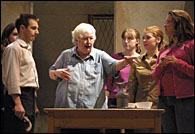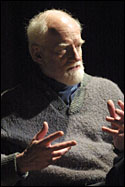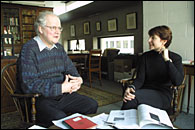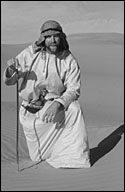On campus
The Rake's Progress progresses
 Director Sue Lawless lays down the law
Director Sue Lawless lays down the lawPHOTO: Owen Egan |
|
Bearded ladies, dubious investment schemes, whores and gambling figure prominently in Igor Stravinsky's The Rake's Progress, along with love as fine and sweet as redemption can be.
Stravinsky's neoclassical opera was inspired by etchings of British artist William Hogarth, showing Tom Rakewell's descent into bedlam by route of debauchery. W.H. Auden and Chester Kallman wrote the poetic libretto.
Opera McGill brings in stage director Sue Lawless from New York City to put her spin on the tale. She tells me she has a contemporary concept up her sleeve, "but we'll not define contemporary -- it's not the '50s, not 2002." Her last work with the company (and the first major opera she directed), Les Contes d'Hoffmann, was a big success.
With a background in American theatre and musicals, Lawless brings a new sensibility to the traditional, static "park and bark" opera direction. "Opera's changing from a grand form to a more naturalistic, artistic form. [Opera Houses] are now doing Sondheim, Sound of Music." It's important for students to have "a knowledge of naturalism on stage."
Lawless finds opera very different from theatre. The physical demands on the performers alone are tremendous, and "the number of people involved is extraordinary!" Double casts, a chorus, coaches galore, all scurrying to create a production. "I equate directing of any kind as being a lion tamer." She is quick to remind students "the profession is not for sissies," and urges them to work hard. "Artistic freedom only comes with discipline, which is so difficult to learn.
"I made my living at it all of my life. I've been blessed with working in every aspect of theatre." She worked the boards from the tender of age of 20, and directed from age 30, back in an era when women directors were non-existent. She started partly out of curiosity, because "men directors were sadistic sons of bitches. What made them like that?"
International affairs
Montreal is playing host to a mock United Nations conference this week. About 1,200 university students from around the world are participating in the McGill Model United Nations Assembly from January 24 to 27.
Organized by IRSAM, (the International Relations Students' Association of McGill), the event will give students an opportunity to experience international affairs and politics. Canada's own ambassador to the United Nations, Paul Heinbecker, will be present to encourage the student initiative. He plans to give a public talk on the pros and cons of the real United Nations over the last decade. This will be IRSAM's 11th model conference. Opening ceremonies are being held on January 24 at 6:30 pm at the Sheraton Hotel, (1201 René-Lévesque Blvd.). Contact: Abdel Hosein, public relations director, McGill Model United Nations; 398-6816 or pr@mcmun.org. Website: www.mcmun.org
Giving direction
 Bill Glassco
Bill GlasscoPHOTO: Owen Egan |
|
Each year, thanks to a donation by Elizabeth and John B Reynolds, the Department of English brings in a prominent figure from either literature, film, or theatre. "It's like a mini artist-in-residence," says professor Nathalie Cooke.
This year's creative atelier has Bill Glassco, cofounder of the Montreal Young Company, leading four director workshops with the final one open to the public. He is directing undergraduate actors in scenes by Shakespeare, and other students get to observe and learn
"This is such a productive experience, and the students appreciate the time and dedication that Glassco puts in. This works because he's being wonderful." Cooke says .
Glassco enjoys a national reputation for carefully nurturing talent and introducing their works to new audiences. For instance, no one has done more than Glassco to ensure that English audiences discovered the plays of Michel Tremblay -- Glassco co-translated and directed many of the Quebec playwright's works.
Glassco says, "I took this on because I love Shakespeare. I used to teach it at the University of Toronto. I love the idea of trying to show students, and discover for myself, what it is that makes us follow Shakespeare on the stage."
He cherishes the text of Shakespeare, and approaches it with reverence, urging directors to think, "Why is that line there, why is that word there? If you took it away what would you lose?" Glassco combines "theatre instincts with trusting that Shakespeare knew what he was doing."
The public workshop is "not about how wonderful the actors are, but to talk about what they are doing, what's been discovered." Come learn for yourself through Glassco's deft handling of scenes from Measure for Measure, the witty Much Ado About Nothing, and the complex Troilus and Cressida.
January 24 at 4 pm in Morrice Hall. Wine Reception to follow in Arts 160.
Poetic nourishment
 David McKnight and Irena Murray
David McKnight and Irena MurrayPHOTO: Owen Egan |
|
Need a little spiritual sustenance at lunchtime? A literary uplift?
Then train your ears onto Poetry @ Lunch, the reading series put together by the Rare Books and Special Collections Division's Irena Murray, chief curator, and David McKnight, digital collections librarian. Poetic licences are issued on the fourth Friday of every month.
Next up is Robert Melançon, an Université de Montréal professor and well-known poet who has been translated into English. He'll read in both languages, including some pieces from his most recent book.
"He's a sterling example of a Quebec intellectual, connected with the world, and the rest of Canada," Murray says.
Five years ago, Murray wanted to initiate a reading series in the division. Initially keen on literature at large, she quickly realized they couldn't have all their literary cake and eat it too.
"If we should focus on something, it should be something that is prominent in our collection, something that is our strength, such as Canadian poetry," Murray says. "Poetry is the most difficult genre to support; we wanted to support what other people neglect."
David McKnight adds that they've become a centre for readings on campus. Originally they offered lunch with poetry, wishing to feed people both spiritually and physically, but that became a little too popular.
"I feared that the first year without lunch the attendance would diminish," McKnight says. But it hasn't. "There's a stable, committed group that comes each time."
McKnight's interest in the avant-garde scene hasn't overly slanted the selection process.
"Both of our tastes are eclectic," he says. They invite local poets, others from across Canada, and poets in different stages of their careers. Word gets out -- the readers seem to have a good time, which encourages other poets to volunteer.
Upcoming wordsmiths this semester are Eric Ormsby, Rhea Tregebov and George Bowering. Readings start at 12:15 pm, and take place in the Lande Reading Room, fourth floor, McLennan Library. Robert Melançon will read January 25.
He's seen sand, he's seen snow
 Bruce Kirkby
Bruce KirkbyPHOTO COURTESY BRUCE KIRKBY |
|
Are you yearning to see a landscape vastly different from our present snow and slush? Well, you might just hop on the 8:30 am shuttle bus to Macdonald campus two weeks from today and escape to the simple beauty of the Arabian desert.
Yes, you read right. On February 7, the Macdonald Campus, known more for its beautiful trees than for desert dunes, makes way for the vast sands visited by Bruce Kirkby.
Kirkby is a Canadian adventurer, photographer and author of Sand Dance: By Camel Across Arabia's Great Southern Desert. The former engineer is also this year's Founder's Day speaker.
Founder's Day marks the birthdate of Sir William Macdonald who, in 1907, founded Macdonald College, as it was then known and which evolved into McGill's Faculty of Agricultural and Environmental Sciences.
Macdonald, who made his fortune as WC Macdonald, tobacco merchant and manufacturer, is also McGill's most important benefactor of all time, putting up numerous buildings -- think of all those Macdonald names -- endowing chairs, establishing scholarships for needy students and buying land. In today's dollars, those gifts would dwarf even the record-setting $64 million donation of Richard Tomlinson a few years back.
Like Macdonald in his day, Kirkby, 34, is one of those who wants to pass on his fervour for learning. When he is not descending Ethiopia's Blue Nile Gorge, crossing deserts or guiding tours in the Canadian north, Kirkby is developing on-line educational programs for children or speaking to groups on his travels and the need to preserve the world's remaining wild spaces and ancient cultures.
"I like to speak about the lives of the people I encounter and the effects that globalization is having on remote cultures, such as the desert Bedouin," he says on the phone from his home in Calgary. "Culture and landscape are both threatened by the speed of change."
As tradition would have it, everyone from both campuses of McGill is invited to attend Kirkby's talk and savour a bit of birthday cake. Visitors will even be regaled by bagpipes as the platform party is piped in to take their places before the formidable portrait of Sir William Macdonald.
Bronwyn Chester
Bruce Kirkby speaks at 10:30 am in the ballroom of the Centennial Building, February 7. For more information, see www.brucekirkby.com.

